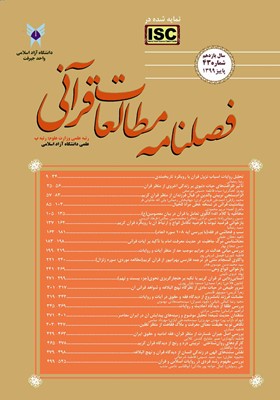کارکردهای روانشناختی- تربیتی درد و رنج از دیدگاه قرآن کریم
محورهای موضوعی : فصلنامه مطالعات قرآنی
1 - استادیار گروه روانشناسی، واحد تویسرکان، دانشگاه آزاد اسلامی، تویسرکان، ایران
کلید واژه:
چکیده مقاله :
دنیایی که ما در آن زندگی میکنیم همراه با رنجها، دردها، گرفتاریها و مشکلات است. دردها و رنجهایی از قبیل تنهایی، نا امیدی، افسردگی و شکست که همانند سایه ما را تعقیب میکنند. در ادبیات قرآنی مسأله سختیها و دشواریها و نقش آنها در زندگی مورد توجه قرار گرفته است. بسیاری از مردم در زندگی خود این حقیقت را تجربه کردهاند که هنگام بروز مشکلات طاقت فرسا و هجوم طوفانهای سخت زندگی، در زمانهایی که انسان دیگر امیدی برای رهایی از آن شرایط سخت و دشوار برای خود تصور نمیکند راه نجات بر رویش گشوده میشود. یکی از کارکردهای دین و کتاب آسمانی ما قرآن کاهش درد و رنج انسان است. در این مقاله، هدف اصلی پاسخگویی به این سؤالات است که درد و رنج از دیدگاه قرآن کریم دارای چه کارکردهای روانشناختی و تربیتی است؟ و آنها چگونه موجب تقویت و تحکیم خداباوری و معرفت انسان به خداوند میشود؟
The world we live in is associated with suffering, pain and troubles and problems. Pains and sufferings such as loneliness, despair, depression and failure that haunt us like a shadow. In Quranic literature, the issue of difficulties and their role in life has been considered. Many people have experienced this fact in their lives that at the time of occurring problems and the onslaught of severe storms of life, salvation way is opened at a time when man no longer has any hope of escaping from those difficult conditions. One of the functions of our religion and divine book, the Qur'an, is to reduce human suffering. In this article, the main purpose is to answer the questions that what psychological and educational functions do suffering have from the perspective of the Holy Quran? And how do they strengthen man's theism and knowledge to God?
قرآن کریم.
نهج البلاغه.
اکبری، محمود. 1396ش، مهارتهای زندگی با رویکرد دینی، تهران: انتشارات فتیان.
پناهیان، علیرضا. 1394ش، چگونه یک نماز خوب بخوانیم، تهران: انتشارات بیان معنوی.
دوست محمدی، هادی. 1382ش، باورهای دینی مطمئنترین عامل آرامش روانی، مجموعه مقالات همایش علمی اسلام و بهداشت روان، تهران: انتشارات پژوهشکده فرهنگ و معارف.
گنجی، مهدی. 1393ش، آسیب شناسی روانی، تهران: انتشارات ساوالان.
میلانی، حسن. 1383ش، چرا مرا آفریدند؟، جزوه درسی، مؤسسه احیای معارف قرآنی قم.
وکیلیان، منوچهر و منیژه کرباسی. 1394ش، مقدمات راهنمایی و مشاوره، تهران: انتشارات دانشگاه پیام نور.
هالجین، ریچارد پی و سوزان کراس ویتورن. 1394ش، آسیب شناسی روانی: دیدگاههای بالینی درباره اختلالات روانی، ترجمه یحیی سید محمدی، تهران: انتشارات روان.
هنر پروران، نازنین و حسین میرزایی کیا و احمد نیری و مریم لطفی. 1393ش، راهنمای عملی درمانگران در درمان مبتنی بر پذیرش و تعهد، تهران: انتشارات امید مهر.
مقالات
توانایی، محمد حسین و الهه سلیم زاده. 1389ش، «بررسی تأثیر مثبت اندیشی از دیدگاه قرآن و حدیث»، مجله پژوهشنامه علوم و معارف قرآن کریم، سال دوم، شماره 7، صص 63- 39.
سلیم زاده، الهه و محمد حسین توانایی. 1393ش، «غلبه بر موانع موفقیت از دیدگاه قرآن و روایات»، فصلنامه مطالعات قرآنی، سال پنجم، شماره 18، صص 136- 119.
علی زمانی، امیر عباس. 1383ش، «ایمان دینی و رنجهای وجودی»، مجله پژوهشهای فلسفی- کلامی، شماره 20 و 21، صص 19-2.
کریمیان، حسین. 1388ش، «روش برخورد با مشکلات از نظر نهج البلاغه»، مجله پیام زن، شماره 202، صص 39-32.
مهدوی، رمضان و مریم علیزاده. 1395ش، «نقش معرفتی درد و رنج از دیدگاه قرآن کریم و روایات»، فصلنامه مطالعات قرآنی، سال هفتم، شماره 28، صص 91-71.
_||_
The Holy Quran.
Nahjolbalaghah
Akbari, Mahmoud 2017, Life Skills with a Religious Approach, Tehran: Fatian Publications.
Panahian, Alireza 2015, How to say a good prayer, Tehran: Bayan Manavi Publications.
Dost Mohammadi, Hadi 2003, Religious beliefs are the surest factor of mental peace, Proceedings of the Scientific Conference on Islam and Mental Health, Tehran: Research Institute of Culture and Education Publications.
Ganji, Mehdi 2014, Psychopathology, Tehran: Savalan Publications.
Milani, Hassan 2004 Why did they create me?, Textbook, Institute for the Revival of Quranic Knowledge in Qom.
Vakilian, Manouchehr and Manijeh Karbasi. 2015, Introduction to guidance and counseling, Tehran: Payame Noor University Press.
Halgin, Richard P. and Susan Cross Witorn. 2015, Psychopathology: Clinical Perspectives on Mental Disorders, translated by Yahya Seyed Mohammadi, Tehran: Ravan Publications.
Honar Parvaran, Nazanin and Hossein Mirzaei Kia and Ahmad Nairi and Maryam Lotfi. 2014, Practical Guide for Therapists in Acceptance and Commitment Therapy, Tehran: Omid Mehr Publications.
Articles
Tawanaiy, Mohammad Hossein and Elahe Salimzadeh. 2010, "Study of the effect of positive thinking from the perspective of the Quran and Hadith", Journal of the Journal of Holy Quran Sciences and Education, Year 2, No. 7, pp. 63-39.
Salimzadeh, Elahe and Mohammad Hossein Tavanaei. 2014, "Overcoming Barriers to Success from the Perspective of the Quran and Traditions", Quarterly Journal of Quranic Studies, Fifth Year, No. 18, pp. 136-119.
Ali Zamani, Amir Abbas. 2004, "Religious Faith and Existential Sufferings", Journal of Philosophical-Theological Research, No. 20 and 21, pp. 19-2.
Karimian, Hussein 2009, "Method of dealing with problems from the point of view of Nahj al-Balaghah", Payam-e-Zan magazine, No. 202, pp.
Mahdavi, Ramazan and Maryam Alizadeh. 2016, "The epistemological role of pain and suffering from the perspective of the Holy Quran and narrations", Quarterly Journal of Quranic Studies, Seventh Year, No. 28, pp. 91-71.

